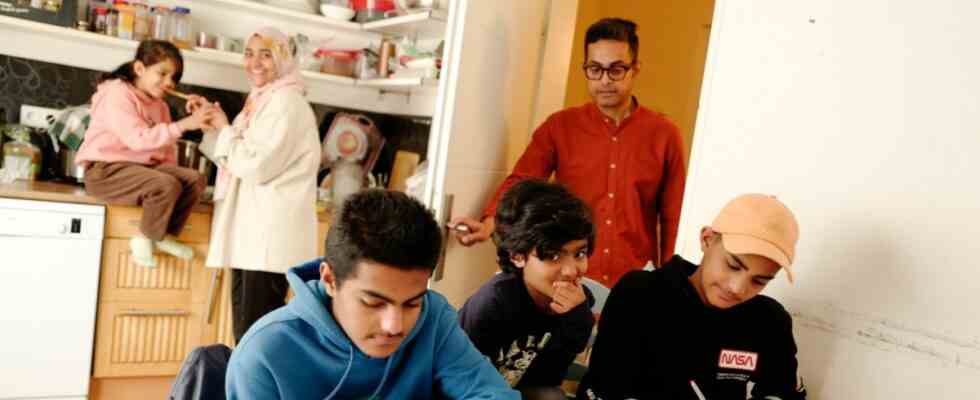Fatima is beside herself with joy. The seven-year-old has arranged her books into an exhibition for the guests. The little dragon coconut is leaning next to Zacharias Zuckerbein and a “Come to school” primer. A year and a half ago, the girl spoke only Arabic. Now she presents her treasures in German, chattering away. Zakarya A. smiles and puts his hands on his daughter’s shoulders. And pushes her down the long hallway into the kitchen, where the big brothers are sitting at the table with a stack of worksheets in front of them.
The casserole doesn’t really come in handy for the boys. Omar, 14, and Amer, 15, are studying for a test the next day at Allach Middle School. “They are lucky and have a very good German teacher,” says her father. The 45-year-old is proud of his children. And Ahmed, at nine, “learns so quickly, he’s the best of them all. His handwriting looks like it’s from here.”
Education was always a great asset in this family. Yemenis have lived in Jeddah, in western Saudi Arabia, for three generations. Zakarya A. worked as a marketing and sales manager for Ikea, among others, and his older sons went to international schools. “But when the war in Yemen started in 2015,” says the father, “everything changed. Yemenis, regardless of whether they were born in Saudi Arabia like us, were no longer welcome to work here or to extend their residence permits.” But where? Not in Yemen, where the war is raging.
The six have been living in a former hotel on Verdistraße since spring 2021, which the city has rented as accommodation for the homeless. First spread over two rooms on different floors and now in a spacious three-room apartment under the roof. “It was a salvation for us,” says Zakarya A., “to have our own bathroom, our own kitchen, our own privacy.”
“I can work, I don’t need money from the state”
In mid-2017, A. was no longer able to extend his residence permit in Saudi Arabia. Then he sets off on his own for the time being, in the West, looking for a new home. “I knew Germany from professional stays. I knew they wouldn’t send me to war. And there are jobs here.” He didn’t think about asylum, “I can work, I don’t need any money from the state. That’s a shame for us.” When A. arrived in Germany at the end of 2018, he still had to apply for asylum. What he didn’t know was that he wasn’t allowed to bring his family with him as long as he didn’t have a residence permit.
“It wasn’t easy for my wife. Although she had our families in Jeddah, she no longer had a residence permit. Where should she go?” asks Zakarya A. In her father’s house, she was given a small room for all five. And waited. While her husband in Germany tried to pull out all the stops. After an amazingly short two months and a special permit, he got a job in sales at H&M, where he still works today. “The fact that I only spoke English at first wasn’t a problem for them.” The curriculum vitae of the studied marketing man appealed to the employers. “I have letters of recommendation from everywhere I’ve been employed.”
The 45-year-old was moved from one refugee accommodation to another, and at some point he was allowed to move to Munich, where he worked and rented a room in a shared flat. Sarah and the children arrived on March 23, 2021 after many bureaucratic hurdles. Since then, the six have lived on Verdistrasse. The beginning wasn’t easy. Fatima suffers from epileptic seizures, they come at night and are partly caused by fears, says her father. Since the family was allowed to move into a shared apartment in the house, things are a little better. “Doctors say she needs to live in a quiet place.”
They want bikes for everyone
The father is constantly looking for him. “I earn 16 euros an hour, that’s quite good, but the rent here is so high, we get child benefit and have to pay what I earn every month.” It is only enough for groceries and the most necessary clothing. He’s looking on the private housing market, but constantly encounters two reservations: “Many landlords don’t want large families or anyone who can’t pay the rent on their own and is therefore supported by the job center.” The city’s online brokerage of social housing, “Sowon”, in which the A. family ranks in the highest priority level, has hardly anything to offer in its size. And if they do, they don’t get a chance. “We would love to live closer to our children’s school so that it’s easier for them to meet their friends,” says the father.
Bicycles to get there easily would also be a relief. That is why Zakarya A. wants some for the children and for his wife and himself. He says: “We don’t have the money for big companies. If we had wheels, we could do something together that didn’t cost anything.”
Here’s how you can donate
Advent calendar for good works of the Süddeutsche Zeitung eV
Stadtsparkasse Munich
IBAN DE 86 7015 0000 0000 6007 00
BIC SSKMDEMMXXX
Donations to the SZ Advent calendar are tax deductible. For transfers of more than 300 euros, we will send you a donation receipt. www.sz-adventskalender.de

